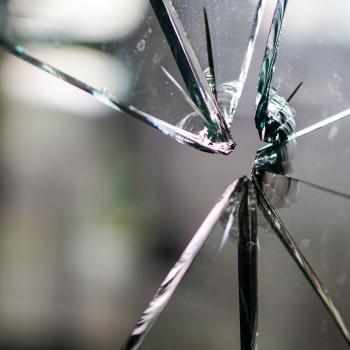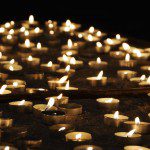In the last few weeks I have found myself particularly affected by the outcome of the Michael Brown and Eric Garner cases. Preparing to be united with all our extended family for a long Thanksgiving weekend, not knowing the next time we would all be together again, I found myself thinking of Michael Brown’s mother. As I cooked cranberries for sauce, and sliced apples for pie, feeling excited to be with people we love, my heart was heavy thinking of another mother, in a nearby state, for whom Thanksgiving will never be the same again. A mother whose young son was killed, whose body lay in the street for hours, and who may never know the whole truth of what her son’s last moments held. I listened to words from a Bruce Springsteen song, and wept:
“41 shots, Lena gets her son ready for school
She says, “On these streets, Charles, You’ve got to understand the rules
If an officer stops you, promise me you’ll always be polite And that you’ll never ever run away Promise Mama you’ll keep your hands in sight”
Is it a gun, is it a knife, Is it a wallet, this is your life
It ain’t no secret, It ain’t no secret, No secret my friend, You can get killed just for living in your American skin”
How did we get here? Luckily for me, I studied history pretty seriously. So mostly, I can answer that question with a reasonable amount of intelligence. I know about the slave trade, the years of slavery, the terror, the Klan, segregation, Jim Crow, and so much. I know about it because I’ve studied, read. But I have no idea what it means to live it. I have a ancestral legacy that includes Ellis Island, Italians with crazy huge families, people eking out a living in the shadow of Northeastern coal mines and railroad yards. But no where in my history are there chains. Lynch mobs. Stepping off the sidewalk to let “your betters” pass. I know about black history, but I don’t have a damn clue. I pride myself on being someone who wants to be part of the solution, but so often, I’ve been part of the problem. This realization came from an unexpected corner.
When Laura of Mothering Spirit asked me to review her wonderful new book Everyday Sacrament, I was more than happy to oblige. Knowing of her struggles with infertility and that she would be reflecting on these in part, I assumed I’d write something that reflected on my own fertility struggles as well. Imagine my surprise when I started reading and this connection to Ferguson and race kept rising in my mind. It kept tugging on my heart, and we all know what that means. The holy Spirit wants me to swallow my courage vitamin and commit these words to the ether.
This connection first jumped out at me when I was reading the chapter on Baptism, and also came across an article about the subtle racism of today, and some statistics from the article left me gobsmacked. We think we “don’t see color” but really, that’s an illusion. One study showed that infants as young as 3 months old show preference for people of the same race. Another one found that white NBA officials call more penalties against black players, and black NBA officials call more penalties against white players. Apparently there is something in us that very subtly shows bias against those of other races. Even when we think we don’t see color, we do.
Can you see where this is going? Where does it begin?
At the beginning. In that garden. With that serpent. When humanity fell from grace. Adam and Eve really screwed the pooch on that one. The effects reverberate through time and space, repercussions of that day visible on the streets of Ferguson, New York City, and in our hearts as well.
Something I learned in my other lifetime, as a student of social justice, is that structural sin and societal sin are just as real as personal sin. And just like our personal sins, sinful structures wreak havoc and thwart God’s vision for humanity. I have heard a lot of people comment on these two situations as isolated events, only looking at each case individually, but this vision is the myopic shortsightedness of the privileged. Sinful structures, within which sinful people are participating (I surely count myself here because I am certainly sinful, and absolutely benefit from these structures), lead to discord, rage, pain, and generations of mistrust and fear.
Do those sound like the fruits of the Spirit?
God’s will is for all of us to be united with Him, in peace and charity. The enemy sows division, fear, bias. This is why the Church calls racism intrinsically evil. We need to take this shit seriously, people. Racism always divides, always destroys. If we want to love justice, as God calls each of us to do, we must root out the seeds of racism and violence that continually threaten to spring up in our souls. Dorothy Day spoke of a revolution of the heart, which would bring about the much-needed revolution in our culture, and that revolution must begin with each one of us. It begins with us, and it extends to every corner of our nation, dismantling unjust structures and replacing them with structures of grace, places where human flourishing can occur.
In my own heart this Advent, God had been showing me, very gently as a loving parent would, those biases and seeds of racism that have taken root in my heart. Those assumptions I have long allowed to grow unchecked, and fears that have caused division, not peace. God has invited me to embrace his justice, to be in ‘right relationship’ with others, most especially the poor and the oppressed. To confront my privilege as an educated, middle-class, able-bodied white woman and not feel guilty about it, for there’s nothing I did to earn it and that sort of guilt only paralyzes. But rather, to confront it, to see what it would be easy to ignore. To listen and learn from the experiences of those who are oppressed because of race. To sincerely apologize for any and every instance of racial bias or implicit racism for which I have been responsible.
Since writing is my craft, to share through the written word of these experiences. In Everyday Sacrament, Laura shares a wonderful quote from Henri Nouwen that touches on what I am trying to do here, this tough work. “Henri Nouwen wrote in Beyond the Mirror that his “deepest vocation is to be a witness to the glimpses of God I have been allowed to catch.” … to notice God at work around me and nudge others to ask “Do you see this, too?”’
This work begins with us, but does not stop there. As parents, it touches our children too. They come into the world with the stain of this original sin, and the tendency toward these biases, but through the grace of baptism, that sin is washed away. Those tendencies, residual effects of the fall, remain, but we as parents are gifted with the amazing responsibility of teaching them about God and the faith and raising them to be just, moral, loving Christians. This is a terrifying task, but also a duty of delight and one that God has clearly entrusted to us. Fanucci says it again, so wonderfully in Everyday Sacrament, speaking of baptism; “But deep in my bones I believe this is the most important thing I’m trying to do as a parent, to awaken my children to the possibilities of faith and a life lived for others out of love.”
With all of these thoughts of baptism, parenting, racism, and how to live justly, swirling around in my brain, I had a strange moment when pop culture and faith smashed right into one another. I had just seen Mockingjay: Part 1 the day before, and something from that series struck me. The mentor character says to the heroine, before she goes into a fight to the death, in which she has been forced to participate, but does not want to: Remember who the real enemy is. We all need this message too. The real enemy is The Enemy, who will use any tool at his disposal, including racism, to divide humanity and keep us from seeing God in our brothers and sisters.
Through the grace of baptism we can confront the seeds of racism and violence, tools of the Enemy, and root them out. We can give the example to our children of having the hard conversations about race and privilege. Apologizing when we have been wrong, and listening to the voices of those who are crying out for justice. We can raise a generation of peacemakers.











